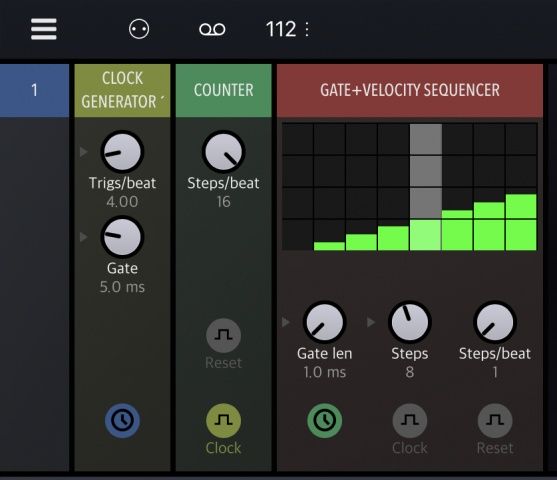Reset Gate Sequencer when Play is pressed
Hello Drambo community.
I know that my question is a very basic one, sorry for that, but I can't find the solution.
I want to control a gate sequencer with a clock generator and I would like the sequencer to reset to zero when I press Play on the transport.
Thanks a lot for your help.


Comments
here's one way:
A little tweak, avoiding the 1ms delay:
Thank you both for your help!
I really appreciate.
Cheers!
play is detected instantly. only stop is 1ms delayed. clever solution using differential tho. scale x10 is necessary to ensure diff detects clock change from one sample to next?
seems like scale x10 is tuned to produce positive differential only when clock starts, but not as clock is running. how does that work @rs2000?
@bangzero When playback starts, the time signal rises and creates a *positive* peak (scaled up so it actually triggers Reset).
When the pattern cycles, the time signal will start from zero again and this will cause a negative peak which doesn't trigger the Reset.
@rs2000, why don't the ongoing changes in time signal during play generate positive peaks also? i guess i don't understand why the differentiator sometimes doesn't produce output even when it's input is changing?
this curious bit may explain some things:
seems like the stopped value of a clock is actually -0.001, not zero as i thought. so when play begins there must be an intial jump from -0.001 to 0, which scale x10 makes large enough to trigger the differentiator?
fwiw, the curious stopped clock behavior, leads to this kind of silly solution:
invert makes the stopped value .001, and all playing values <= 0. and the neg module actually seems to be "input <= 0", instead of a true logical not. not sure i'd count on that in future releases, or the negative stopped clock value either? but kind of fun. :^) sorry to nerd all over your question @doug_meatloaf. and thanks for the puzzle @rs2000!
@bangzero A few answers here:
Ah, one more thing just came to my mind @bangzero!
I guess you're using the Oscilloscope to measure?
I've nagged @giku quite a few times and he was kind enough to add better port monitoring.
Get the latest Drambo AppStore release and be surprised what happens if you tap-hold any signal port :)
@rs2000, did you try the scale x1000 on a stopped clock? it's reliably -.001 here.
been using the new input monitors lots. still like the scope module for always on signal monitoring. is there a way to change the x-scale of the input monitors? or set a trigger threshold?
Indeed.
My guess is that @giku has decided to put a slight negative offset in order to make sure the time signal would always cross the zero line.
Enjoyed your discussion.
Helped understand some things!
@bangzero Yes, you can change the Scope X and Y scales by simply dragging along the X and Y axis.
No trig threshold setting for now. X scale is a seamless adjustment though so unlike with the Oscilloscope module, it's easier to monitor periodic signals now.
iirc, it doesn't go < 0 while playing. maybe it's just the value that means stop? @giku? can we rely on this in the future? it's quite useful.
Good idea!